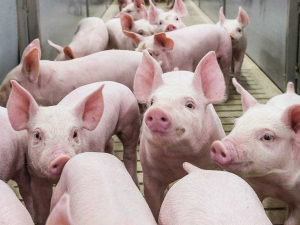Pork imports furore
Pork farmers says a significant influx of imported pork is causing them concern.
 US farmers say without government assistance, pigs may soon need to be culled on farms as there will be no room for them in pork plants.
US farmers say without government assistance, pigs may soon need to be culled on farms as there will be no room for them in pork plants.
US pig farmers could soon be culling on-site due to a COVID-19 induced backup at meatpacking plants.
According to a report by the Food & Environment Reporting Network (FERN), as many as 2 million pigs may be backed up on US farms due to slowed production and closures of meatpacking plants.
The statistics are based on claims from three US economists during a teleconference sponsored by the National Pork Board.
David Miller of Decision Innovation Solutions, associate professor Lee Schulz of Iowa State University, and associate professor Scott Brown of the University of Missouri all agreed during the teleconference last Thursday that a large number of pigs will be backed up.
Schulz says the backlog could exceed 2.2 million heads, whereas Miller estimated a backlog of 1.2 million and around 2.1 heads having disappeared since March 1, either due to direct sales, custom butchering, or euthanasia by farmers.
Brown says his estimates would be closer to Miller, who also claimed that pork prices in Autumn could be 20% to 25% lower than the year prior due to the potential backlog.
FERN says that USA pig farmers are using the numbers as evidence they need government further government support. Without such support, they say pigs may need to be culled on farms as there will be no room for them in pork plants.
Pāmu has welcomed ten new apprentices into its 2026 intake, marking the second year of a scheme designed to equip the next generation of farmers with the skills, knowledge, and experience needed for a thriving career in agriculture.
One team with 43 head, including a contingent from Mid Canterbury, are reflecting on a stellar NZ DairyEvent.
Fonterra farmer shareholders have approved the mechanism for a $2/share capital return expected from the sale of its global consumer and associated businesses.
Trainees in the horticulture industry studying towards a certificate or diploma can now apply for Horticulture New Zealand's (HortNZ) 2026 Industry Training Scholarships programme.
OPINION: The first three Global Dairy Trade (GDT) auctions have been a morale booster for farmers.
Former Fonterra executive Alex Turnbull has been appointed CEO to lead all five Yili Oceania Business Division companies in New Zealand.

OPINION: Here w go: the election date is set for November 7 and the politicians are out of the gate…
OPINION: ECan data was released a few days ago showing Canterbury farmers have made “giant strides on environmental performance”.